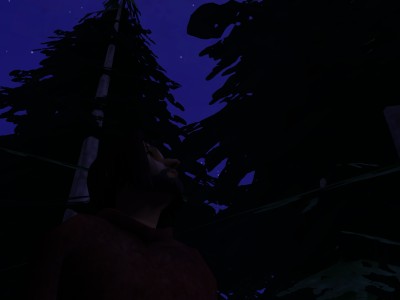
The forest was eerily silent at this time of year and at this time of night. There were no crickets and no frogs to chirp and peep, and the animals of a pine forest were a quiet lot as they scurried over a bed of needles instead of the crisp, newly fallen leaves of the forests lower down in the valley.
This silence suited Egelric very well. He was going down to the lakeside from the camp where the workers still diced and drank and laughed and sang, but the pine branches filtered the sounds that came down from the hills until, by the time he arrived at the shore, the air had been purified into silence again.
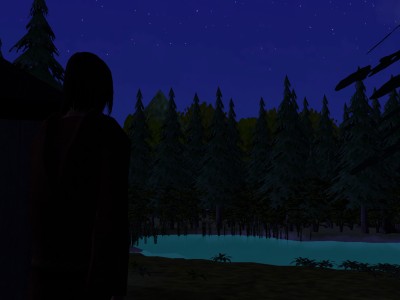
He had built himself a small shack on the shore, and here he slept, away from the men. He had not so much as a fire, but he could not bear to share theirs with them.
In truth, the first time he had come down the hill to the lake, he had realized that he had slept here before. Some memory returned to him of those three days he had spent far from the fires of men, of the time when his belief in his curse was strongest, and when Gunnilda had come to him and brought him home—
He would not think of Gunnilda now, but he would remember some part of those three days. He had slept here, though he did not know how. Under a pine, surely. A man could hardly ask for a softer bed. Nor did he remember what or how he had eaten—perhaps he had not eaten at all. But he knew these shores, though they had been icy then.
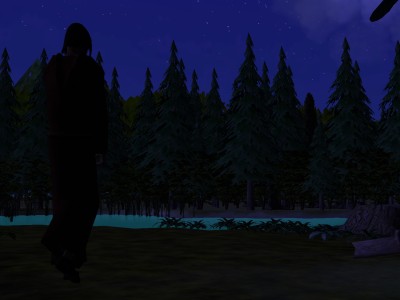
Now he slept here every night, more comfortably than he had then, but with the same animal aversion to human company that sent certain otherwise loyal dogs away from the firesides at night, even when the wind howled.
All that grew on this flank of the hill was pine and yew and holly. The forest looked the same at any time of the year, with only a blanket of snow more or less to tell the season. The pines too suited Egelric very well.
When he was a young boy living still at his father’s house, there had been a broad stand of pines behind, and he had loved to play there, and he had loved the sound they made.
Once, when he was small, his father had found him lying there at night, below trees so old that they were bare of branches for a long way up their trunks. His father had lain down next to him and looked up with him for a while at the few stars that peeked between the branches, and finally Egelric had asked him, “What is that sound?” The sound he meant came from so far overhead that he could scarcely believe it was real.
His father had said, “What sound? Do you mean that low sound like a long sigh? That is the sound of the sky in the pines.”
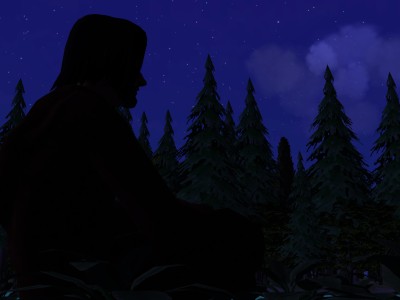
That was the summer before he died.
Of course, he should have said it was only the wind in the pines. No—what he truly should have said was, “Get in the house and get to bed.” But that would not have been like his father at all. He thought that his lord would have called his father a poet—not that his father had ever written a poem—not that his father even knew how to write—but that was not what his lord meant by ‘poet’ anyway.
There were many things about his laughing, boyish father that Egelric had forgotten, to his great sorrow, but he still remembered what his father said about the sky in the pines. It was something he would tell his son, someday.
He often told himself what he would do with his son, someday. It gave him the chance to begin over again as a father, and not make the mistakes he had with Iylaine. Of course, all was perfect in his mind, but it was only in his mind. No doubt he would have been a miserable excuse for a father with Finn as well.
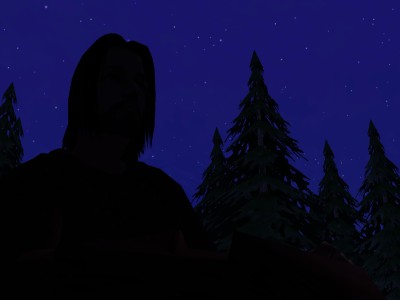
He had none of his own father in him: only enough memories to show him how he was doing wrong, only enough to show him what a father was supposed to be.
Every time he snapped at Iylaine, every time he nagged her to put the cat out or wipe her feet or wash her face, he could hear his own mother speaking through him. It was a wonder he had not yet struck her in anger as his mother so often had him. Perhaps he did not because he was a man and she a girl—he had never struck Elfleda either—but he did not feel confident that he never would. He knew his temper, and he knew it for his mother’s.
He remembered how, when he was a small boy and they still lived in the little house beneath the pines, his father would come lie beside him on the floor when it was time for him to go to bed, and he would tell him such stories! Egelric would lie curled up on his side, with his hands clasped between his knees, and, if it was winter, his back to the fire… And his father would lie with his face close to his, and in a whisper tell him the most impossible, the most absurd adventures that he was supposed to have had as a boy: the time he went to stand on the face of the moon, and sunk in up to his knees… the time he caught a big fish and, when he slit it open, found an angry dwarf inside… the time he had pulled his hat down so far around his head that he thought he had gone blind, and walked into an enormous bear’s mouth, thinking it was his front door…
Egelric laughed now to think of it—a laugh that caught in his throat, and hurt him, and brought tears to his eyes.
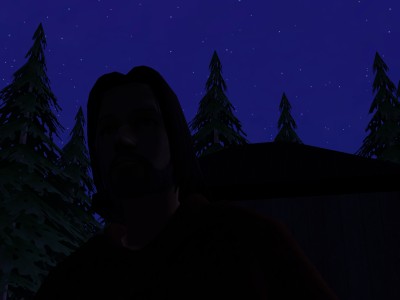
But there was always his mother to grouse after a while—“Come to bed, Gils. It’s sleep and not your nonsense the boy’s needing.”
Sleep! He had all of his life ahead of him in which to sleep, and all eternity thereafter. What he had needed more than anything was a few more years of his father’s nonsense.
Egelric stood, sick at heart. One could not expect a man who had had an unhappy childhood to make a happy one for his daughter. He tried, God knew he tried. But these days he thought Iylaine preferred Alwy to him. He had never fretted much to see her love for Gunnilda—a girl needed a mother, after all. But it was hard to see her cling to Alwy the way she did now.
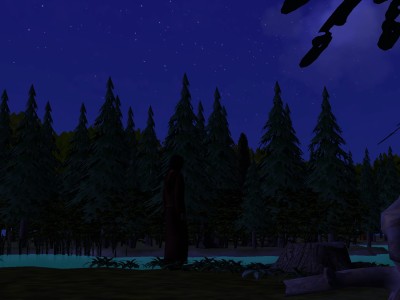
Alwy had explained it thus: “I guess you know what it’s like to be a boy what picks on other kids, and I know what it’s like to be a boy what the other kids pick on.” It was a cruel thing to say, or would have been from anyone but simple-minded, deep-hearted Alwy, but it was true. What Alwy was trying to say was that he could not understand her pain.
He would have been content merely to spare her from it, but this too was beyond him. And now he could scarcely bear to look her in the eyes, for he could see it there.
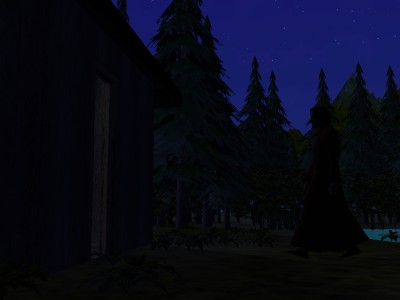
He turned away from the lake and walked through the empty doorway—he had not even a door in his shack, only a scrap of cloth that he pulled across to keep out the wind—but he stopped in mid-stride as he heard a rustle come from the bed.
“You again,” he growled.
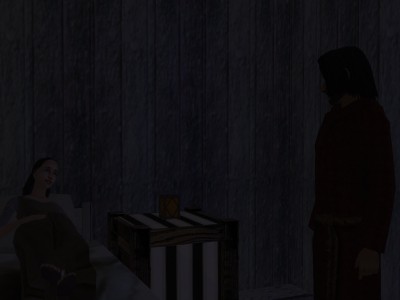
“Me again,” she chirped in all her insolence.
“You always know when I most want to be alone, and only then do you come.”
“I know what you really want.”
“How long have you been here?” he asked, ignoring her thrust.
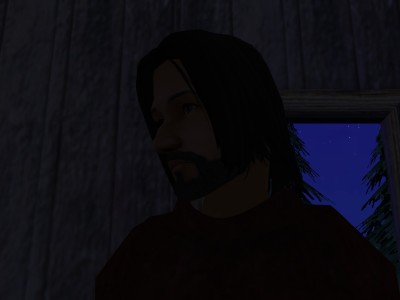
“Hours, I’m sure. I heard you out there.”
“Luckily for you, you didn’t step outside. I would have thrown you in the lake.”
“I can swim.”
“Then I would have held you down.”
“You like to hold me down, don’t you?”
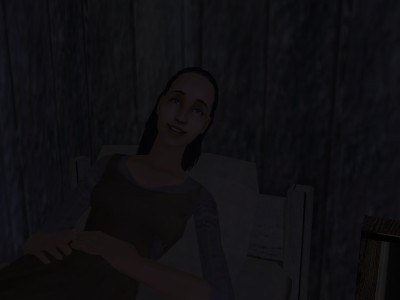
Again, he ignored her impudence. He took off his cloak and hung it on the peg.
“Won’t you light the lamp?” she asked.
“If you knew what I saw when I look at you, you wouldn’t be so eager for me to light the lamp,” he grumbled, but he lit it.
“What do you see?”
He glared at her. “A hole.”
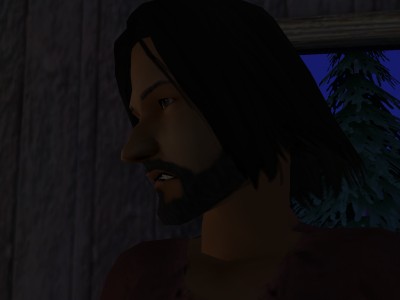
She laughed. “Two or three, I would say.”
He sat on the chair and began unlacing his boots.
“I like to look at you, you know,” she said. “Ever wonder what I see when I look at you?”
“No.”
“Seed.”
He snorted. “You think I could be so foolish?”
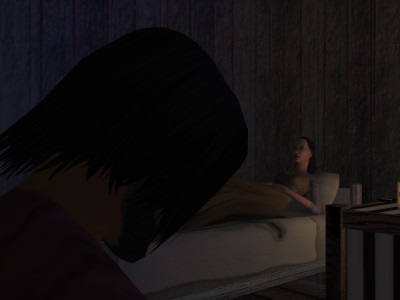
“You will slip one of these nights. It always happens sooner or later. I think that a child of yours would be well provided for.”
“I should provide for it in the same way I provide for kittens I don’t want,” he sneered.
“You wouldn’t neither.”
“Sometimes I don’t wait for the kittens and provide for the mother cat directly.”
“You wouldn’t neither.”
“I do not recommend you try me.” He rose and hung the cloth in the doorway before undressing.
“You don’t frighten me.”
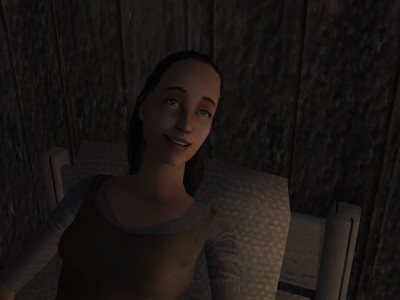
“That is most unwise, when dealing with a man who frightens himself sometimes.”
Now it was she who snorted.
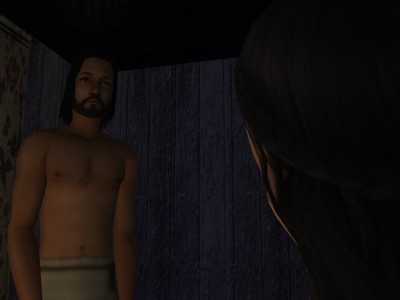
“You are correct about one thing,” he said. “It is very likely I shall slip one of these nights, but what I mean is that I shall slip and kill you. You had better stop taking chances.”
“Did you just threaten to kill me?”
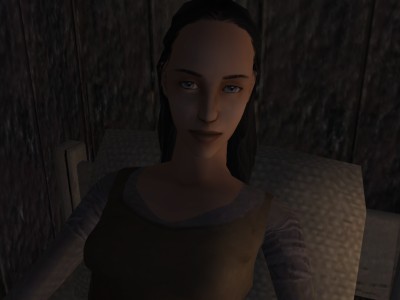
“Call it a warning.”
“I don’t believe you,” she sniffed. “You’re not a monster. You only like to pretend to be. You’re not the only man like that, you know.”
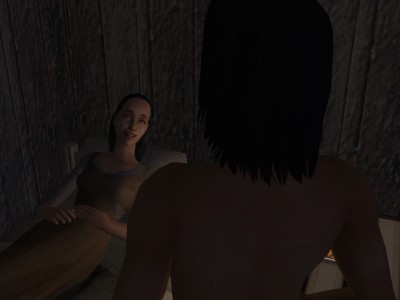
“Put out the lamp,” he said abruptly.
“Why?”
“Because it makes me sick to look at you.”
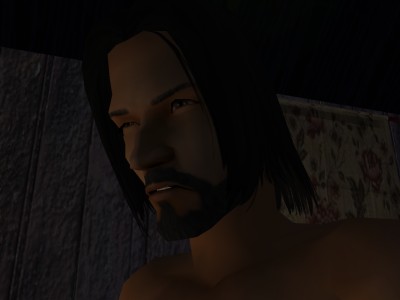






Who is that woman? I don't recognise her? And why are they so mean to each other?